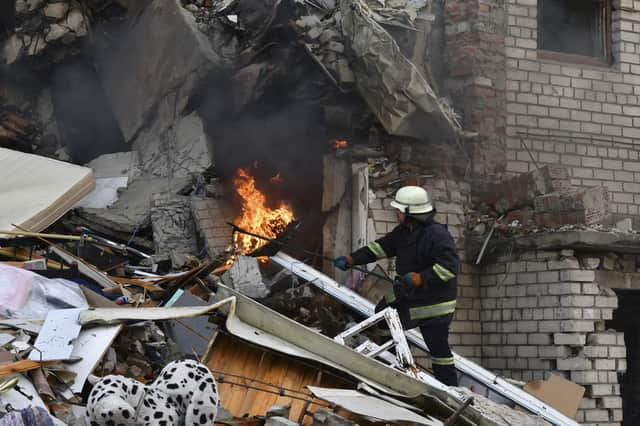Ian Ellis: World church assembly meets in 'shadow' of Ukraine war


Prof Ioan Sauca, the WCC's acting general secretary, was speaking at one of the regular assembly press conferences I attended online.
The WCC is a fellowship of 352 churches from over 120 countries, representing over 580 million Christians.
Advertisement
Hide AdAdvertisement
Hide AdAlthough the Roman Catholic Church is not a member it works closely with the Geneva-based council and is a full member of the WCC's faith and order commission.
The Church of Ireland and the Methodist Church in Ireland are full council members from this island.
Acting general secretary Sauca, himself of Romanian Orthodox background, told an assembly press conference that people all over the world are seeking reconciliation and healing.
He said that while the churches are continuing to struggle to reach agreement on theological matters, this did not mean that they could not walk together in a yet more united way to try to meet such need.
Advertisement
Hide AdAdvertisement
Hide AdAs an expression of such a healing outreach, Prof Sauca visited Ukraine in early August. The purpose of that visit was to listen to the representatives of local churches, as well as state institutions, and to ensure the participation of the Ukraine’s churches at the assembly in Karlsruhe, Germany.
He commented at the time: “When one part of the body suffers, all parts suffer with it. We are in Christian solidarity with all those who suffer in Ukraine.”
A WCC statement of June 18 had lamented “the illegal invasion Russian Federation has launched on its neighbour, a sovereign state, resulting in appalling toll of death, destruction and displacement for people of Ukraine”.
There were 11 representatives of Ukrainian churches present at Karlsruhe, as well as a delegation representing Russian believers.
Advertisement
Hide AdAdvertisement
Hide AdThe leader of the Russian Orthodox Church, Metropolitan Kirill, has supported President Putin's aggression in Ukraine, but Prof Sauca said that those in charge of the assembly had decided, after very careful consideration, not to expel the Russian Orthodox Church from membership of the council.
The moderator of the WCC's central committee, Dr Agnes Aboum, and Anglican from Kenya, said the council is a “global sacred space”.
She said it is important for people from conflict areas to have the opportunity of “listening to each other's pain and wounds, as well as their expectations”.
Indeed, in an address to the Karlsruhe assembly, the president of Germany, Dr Frank-Walter Steinmeier, commented: “Here in Germany we remember with thankfulness that the German churches were actually permitted to attend the very first [WCC] assembly in Amsterdam in 1948 and were welcomed as members on an equal footing.
Advertisement
Hide AdAdvertisement
Hide Ad“After the horror that the German Reich unleashed on the world, after the war, after the systematic persecution and murder of Europe’s Jews, after all these unspeakable crimes, that was not something that could be taken for granted.”
Speaking to me, the spokesperson of the Russian Orthodox Church delegation to the WCC assembly, Vakhtang Kipshidze, said that while the delegation noted that the WCC has deplored the Russian state's military action in Ukraine, the delegation also noted that the WCC prefers the use of the language faith over the language of politics.
He commented that the delegation also noted that the WCC had decided not to expel the Russian Orthodox Church and wanted to promote dialogue with the Russian Orthodox Church, which is supportive of the Russian state.
Mr Kipshidze, who portrayed the war in Ukraine in terms of "politics", also said that the Russian Orthodox Church “prays for peace and wishes to invest in reconciliation in Ukraine”.
Advertisement
Hide AdAdvertisement
Hide AdWhen I asked him if there is any body of opinion within the Russian Orthodox Church that does not agree with its hierarchy's support for Russia's current military action in Ukraine, Mr Kipshidze replied: “There are several priests, maybe several dozens of priests, a small minority, who try to get involved in political opposition to the Russian state. They have been supported by the EU parliament and other political leaders and institutions in the West.”
However, addressing the assembly, Archbishop Yevstratiy from the Orthodox Church of Ukraine, which is independent of the Russian Orthodox Church, stated: “For more than three centuries, the Russian Empire and the Soviet Union has tried to erase the uniqueness of Ukrainian people.”
He said he appreciated the ecumenical organisations for their strong position against the Russian aggression and their appeals to the pro-Kremlin Patriarch Kirill: “No one has the right to bless aggression, no one has the right to justify war crimes and acts of genocide.”
Speaking to me as a representative of the Orthodox Church of Ukraine delegation, Rev. Rostyslav Vorobii said he was unsure about the WCC's decision not to expel the Russian Orthodox Church from membership and was sceptical about the value of discussions with its representatives.
Advertisement
Hide AdAdvertisement
Hide AdHowever, the Karlsruhe meeting was an opportunity for discussions and I was told that some informal, off the record meetings did take place between church representatives from Ukraine and representatives of the Russian Orthodox Church.
Nonetheless, such encounters must have been extremely difficult.
l Canon Ian Ellis is a former editor of The Church of Ireland Gazette.